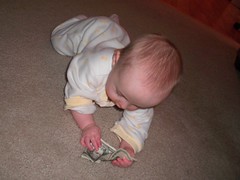What would your future-you have to say to you?
The no-pants guide to spending, saving, and thriving in the real world.
What would your future-you have to say to you?
 Baby Steps” width=”180″ height=”240″ />
Baby Steps” width=”180″ height=”240″ />Fixing a lifetime of financial mistakes can be an intimidating process. Scratch that. It’s always an intimidating process. Where do you start? You’ve got a pile of bills, a dozen messages from bill collectors and two bi-weekly paystubs. What next?
Traditionally, and according to Dave Ramsey, the first step to fixing your finances is to make a budget, but he and tradition are wrong. The first step is to get everybody involved in your finances on the same page. If your spouse isn’t on board with paying off the debt and spending responsibly, nothing else will work.
Once you have that out of the way, you can move on to the traditional first step, making a budget. I’ve gone over my process to build a personal financial plan in quite a bit of detail, so I’ll just hit the highlights this time.
First, make a list of all of your expenses. Include all of your utilities, debt payments, tax payments and absolutely everything else. You need to know the amount of the payment and the frequency. If a bill is due quarterly, divide it by three and you’ll know what you need to set aside each month. Round up in all cases so you can build an automatic cushion.
Next, make a list of your income sources. For most people, this is far easier than tracking their expenses. Figure out your monthly income. If you get paid weekly, that that amount times 52, then divide by 12 to get your monthly income.
Finally, subtract your expenses from your income. If your total is a positive number then you are golden. If you total is negative, you have been a bad monkey. You need to make some cuts, and they may be painful. If your outgoing money is more than your incoming money, it is not possible to get ahead.
Once you have your income and expenses recorded, and you have made the cuts necessary to have a positive balance at the end of the month, you have a successful budget. Congratulations!
It’s true that the benefits of a parent cannot be measured or quantified in any meaningful way. It’s hard to put a price on the emotional commitment and special experience of raising a child as a parent, some of which may not even be realized by the parents themselves until afterwards. But it is undeniable that the experience of parenthood is a rewarding and special time in someone’s life.


Ten years ago, I buried myself in debt. There was no catastrophic emergency or long-term unemployment, just a series of bad decisions over the course of years.
We bought a (short) series of new cars, a house full of furniture, electronics, hundreds of books and movies, and so much more. We threw a wedding on credit and financed an addition on our house. We didn’t gamble or drink it away, we just spent indiscriminately. We have a ton of stuff to show for it and a peeling credit card to prove it.
What changed?
In October 2007, we found out brat #3 was on the way. Don’t misunderstand, this was entirely intentional, but our…efficiency caught us by surprise. It took several years to get #2. We weren’t expecting #3 to happen in just a couple of weeks. #2 wasn’t even a year old when we found out she was going to be a big sister. That’s two kids in diapers and three in daycare at the same time.
The technical term for this is “Oh crap”.
I spent weeks poring over our expenses, trying to find a way to make our ends meet, or at least show up in the same zip code occasionally.
I finally made my first responsible financial decision…ever. I quit smoking. At that point, I had been smoking a pack a day or more for almost 15 years. With the latest round of we’re-going-to-raise-the-vice-tax-to-convince-people-to-drop-their-vices-then-panic-when-people-actually-drop-their-because-we-made-them-too-expensive taxes, I was spending at least $60 per week, at least.
Interesting side story: A few years ago, Wisconsin noticed how many Minnesotans were crossing the border for cheap smokes and decided to cash in by raising their cigarette taxes. The out-of-state market immediately dried up. Econ 101.
So I quit, saving $250 per month.
Our expenses grew to consume that money, which we were expecting. (Remember, we were expecting a baby!) Unfortunately, our habits didn’t change. We still bought too much, charged too much on our credit cards, and used our overdraft protection account every month. At 21% interest!
Nothing else changed for another year and a half. My wife would buy stuff I didn’t like and we’d fight about it. I’d buy stuff she didn’t like and we’d fight about it. When we weren’t arguing about it, we’d just silently spend it all as fast as we could.
Bankruptcy was looming. We had $30,000 on our credit cards and our overdraft protection account was almost maxed out. Have you ever thought you’d have to sell your house quickly?
One day, while I was researching bankruptcy attorneys, I ran across Dave Ramsey. When I got to daycare that evening to pick up the kids, I noticed they had The Total Money Makeover on the bookshelf, so I asked to borrow it.
I read the book twice, had a very frank discussion with my wife about the possibility of bankruptcy, and we set out on the path to financial freedom together.
What made you decide to handle your finances responsibly? Or, perhaps more importantly, what’s holding you back?
This topic has been blatantly stolen from Budgets are Sexy.
1) How do you spend: cash, debit or credit? I use cash almost exclusively. I live in Minnesota and have two small children, so bundling the brats up to go inside the gas station to pay is nuts. Gas stations get the debit card. Online shopping, or automatic payments set up in the payee’s system are done on a credit card that gets paid off every month.
[ad name=”inlineright”]2) Do you bank online? How about use a financial aggregator (Mint, Wesabe, Yodlee, etc.)? I bank online. I use USBank for my daily cash flow, INGDirect for savings management and Wells Fargo for business. I used Mint strictly as a net worth calculator and alerting system. I use Quicken to manage my money and a spreadsheet for my budget, but I really like the quick, hands-off way that Mint gathers my account information and emails low balance alerts.
3) What recurring bills do you have set on autopay? Absolutely everything except daycare, 2 annual payments, and 1 quarterly payment.
4) How are your finances automated? I use USBank’s billpay system, instead of setting up autopayments at every possible payee. This gives me instant total control and reminders before each payment. The exceptions are my mortgage, netflix, and Dish. My mortgage company takes the money automatically from my checking. The other two hit a credit card automatically. Our paychecks are direct-deposited and automatically transferred to the different accounts and banks, as necessary.
5) Do you write checks? If so, how often? Once per week, for daycare. Occasionally for school fundraisers.
6) Where do you stash your short-term savings? I have quite a few savings accounts with INGDirect to meet all of my savings goals. For the truly short term, I add a line item in Quicken and just leave the money in my checking account.
Who’s next?


I just got an email from INGDirect. To celebrate Independence Day, they are having a sweet, sweet sale.
You can:
Take advantage of all of that and you’ll get $2054 in cash or discounts.
Seriously, this deal rocks. If you don’t have an INGDirect account, get one. There are no overdraft fees and no monthly fees.
The sale ends tomorrow at midnight, so hurry.